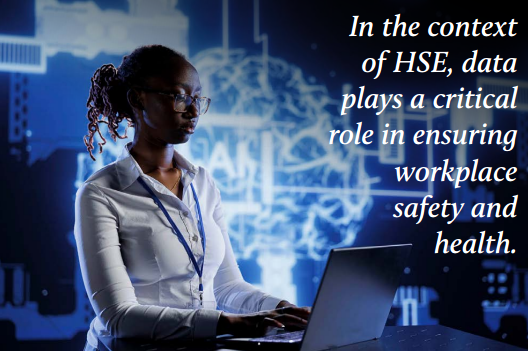Empowering Digital Literacy With Data:
Unleashing Opportunities in Adversity
By Dr. Letetia Mary Addison

LINKAGE Q3 (2024) - OPPORTUNITY IN ADVERSITY
I
n an AI era where digital transformation is not just a trend but a necessity, data has become a crucial asset for navigating the complexities of a rapidly changing world. As businesses and educational institutions strive to overcome challenges, digital literacy, especially when intertwined with data competencies, stands as a strategic tool for success. This article explores the intersection of digital literacy, data, and the potential for business and educational success, particularly within technology, ESG, the economy, the environment, and HSE. As a Statistics and Data Science tertiary educator and a Women and Data Science Ambassador, I believe that enhancing digital literacy with data is not just an opportunity but a necessity in this fast-paced world.
Understanding Digital Literacy in the Data-Driven Era
Digital literacy traditionally refers to the ability to use digital technologies effectively. However, in the data-driven era, it transcends basic skills and includes the capacity to interpret, analyse, and apply data to make informed decisions. This shift is particularly significant in tertiary education, where the future workforce is being prepared to navigate a world increasingly governed by data.
Educators must ensure that students understand not only the mechanics of data but also its broader implications. They need to be equipped to ask the right questions, challenge assumptions, and use data to drive meaningful change. In the context of inclusivity in the field, bridging the gender gap in STEM fields is essential for fostering diverse perspectives that lead to innovative solutions.
Data as a Strategic Asset in Overcoming Adversity
Adversity often drives innovation. Businesses that embraced digital transformation during challenging times, such as the COVID-19 pandemic, demonstrated resilience and agility. Data plays a pivotal role in this transformation, providing insights needed to pivot strategies, optimise operations, and identify new opportunities.
In the technology sector, data-driven decision-making has become a cornerstone of success. Companies leverage big data and analytics to understand customer behaviour, streamline supply chains, and enhance product development. This approach allows businesses to remain competitive, even in uncertain economic climates.
From an ESG perspective, data is crucial for measuring and improving sustainability efforts. Companies are increasingly accountable for their environmental impact, social responsibility, and governance practices. By harnessing data, organisations can monitor their carbon footprint, ensure fair labour practices, and maintain transparency with stakeholders. This not only mitigates risk but also enhances brand reputation and attracts socially conscious investors.
The Role of Tertiary Education in Advancing Digital Literacy
Tertiary education institutions play a crucial role in advancing digital literacy. As educators, our responsibility extends beyond ensuring that students are proficient in using digital tools; we must also instil an understanding of the ethical implications of data usage. This is especially important in fields like data science, where the potential for bias and misuse of data is significant.
Curricula must evolve to include comprehensive data literacy education that goes beyond technical skills. Students should be encouraged to critically analyse data, question sources, and consider the societal impact of their work. This holistic approach to digital literacy will prepare them to navigate the complexities of the modern workforce.
The promotion of diversity in data-related fields is also essential. In the AI age, encouraging more females to pursue data-centric careers not only addresses gender disparities but also enriches the field with diverse perspectives that can lead to more innovative solutions.
Data-Driven Strategies in Higher Education
In my current work on Predicting student retention in higher education institutions (HEIs), I have led the development of data-driven strategies that significantly contribute to enhanced student interventions. By integrating machine learning, through the creation of a Student Retention Predictive Model (Addison and Willams, 2023), we identified critical base factors influencing student retention, such as faculty, hinged on the idea of using a statistical, classification model to predict the risk of student dropout. This approach has influenced more data-driven targeted intervention strategies, as part of a larger perspective to ultimately reduce socio-economic inequalities.
Leading this initiative underscored for me the transformative power of data literacy in education. I believe that incorporating such data-driven approaches into educational curricula is essential. Students must be trained not only to be consumers of data but also to think critically and leverage data effectively to make informed decisions that drive meaningful change.
 ESG, Environment, and Data: Navigating Challenges with Insight
ESG, Environment, and Data: Navigating Challenges with Insight
The intersection of ESG, environmental concerns, and data exemplifies how digital literacy can create opportunities in adversity. As climate change and environmental degradation continue to pose significant challenges, data-driven approaches are essential for developing effective solutions.
Organisations prioritising ESG initiatives are increasingly turning to data to track their environmental impact, reduce waste, and promote sustainability. For instance, data analytics can help companies optimise energy usage, manage resources more efficiently, and develop products with a lower environmental footprint. This aligns with consumer demand for more sustainable products and practices.
In the context of HSE, data plays a critical role in ensuring workplace safety and health. By analysing data on workplace incidents, organisations can identify patterns, predict potential risks, and implement preventive measures. This proactive approach not only protects employees but also reduces costs associated with workplace injuries and illnesses.
The Future of Digital Literacy: A Call to Action
As we look to the future, it is clear that digital literacy, underpinned by strong data competencies, will be essential for overcoming the challenges of tomorrow. Whether in business, education, or personal development, the ability to leverage data effectively will be a key determinant of success.
For tertiary educators, this presents both a challenge and an opportunity. We must adapt our teaching methods to prepare students for a world where data is ubiquitous and critical thinking is paramount. This includes fostering an environment where diversity is valued, and students are encouraged to explore the ethical dimensions of data use.
In the broader context, businesses must recognise that digital literacy is not just a technical skill but a strategic asset. By investing in digital literacy programmes, organisations can empower their workforce to drive innovation, enhance resilience, and seize new opportunities in the face of adversity.
Conclusion
Overall, digital literacy with a focus on data is a powerful tool for navigating the complexities of the modern world. As we face unprecedented challenges in technology, ESG, the economy, the environment, and HSE, the ability to harness data effectively will be crucial for success. Tertiary educators must equip students with the skills and knowledge needed to thrive in a data-driven world. By doing so, we not only prepare them for future careers but also contribute to a more resilient, innovative, and equitable society.
Reference:
Addison, L. and Williams, D. (2023), "Predicting student retention in higher education institutions (HEIs)", Higher Education, Skills and Work-Based Learning, Vol. 13 No. 5, pp. 865-885.
https://doi.org/10.1108/HESWBL-12-2022-0257
ABOUT THE AUTHOR

Dr. Letetia Mary Addison (PhD, SFHEA) is a Project Officer/Lecturer at The University of the West Indies (UWI) and also serves as the Women in Data Science Ambassador for Trinidad and Tobago. Connect with her on Social Media via LinkedIN.